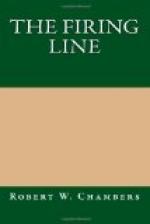But first must come that wonderful year he had planned—or, if he tired of the pleasure sooner, then, as the caprice stirred him, he would do what he had planned to do ever since his father died. The details only remained to be settled.
For Malcourt, with all the contradictions in his character, all his cynicism, effrontery, ruthlessness, preferred to do things in a manner calculated to spare the prejudices of others; and if there was a way to accomplish a thing without hurting people, he usually took the trouble to do it in that way. If not, he did it anyway.
And now, at last, he saw before him the beginning of that curious year for which he had so long waited; and, concerning the closing details of which, he had pondered so often with his dark, handsome head lowered and slightly turned, listening, always listening.
But nothing of this had he spoken of to his wife. It was not necessary. He had a year in which to live in a certain manner and do a certain thing; and it was going to amuse him to do it in a way which would harm nobody.
The year promised to be an interesting one, to judge from all signs. For one item his sister, Lady Tressilvain, was impending from Paris—also his brother-in-law—complicating the humour of the visitation. Malcourt’s marriage to an heiress was the perfectly obvious incentive of the visit. And when they wrote that they were coming to New York, it amused Malcourt exceedingly to invite them to Luckless Lake. But he said nothing about it to Portlaw or his wife.
Then, for another thing, the regeneration and development, ethically and artistically, of Dolly Wilming amused him. He wanted to be near enough to watch it—without, however, any real faith in its continuation.
And, also, there was Miss Suydam. Her development would not be quite as agreeable to witness; process of disillusioning her, little by little, until he had undermined himself sufficiently to make the final break with her very easy—for her. Of course it interested him; all intrigue did where skill was required with women.
And, last of all, yet of supreme importance, he desired leisure, undisturbed, to study his own cumulative development, to humorously thwart it, or misunderstand it, or slyly aid it now and then—always aware of and attentive to that extraneous something which held him so motionless, at moments, listening attentively as though to a command.
For, from that morning four years ago when, crushed with fatigue, he strove to keep his vigil beside his father who, toward daybreak, had been feigning sleep—from that dreadful dawn when, waking with the crash of the shot in his ears, his blinded gaze beheld the passing of a soul—he understood that he was no longer his own master.
Not that the occult triad, Chance, Fate, and Destiny ruled; they only modified his orbit. But from the centre of things Something that ruled them was pulling him toward it, slowly, steadily, inexorably drawing him nearer, lessening the circumference of his path, attenuating it, circumscribing, limiting, controlling. And long since he had learned to name this thing, undismayed—this one thing remaining in the world in which his father’s son might take a sporting interest.




